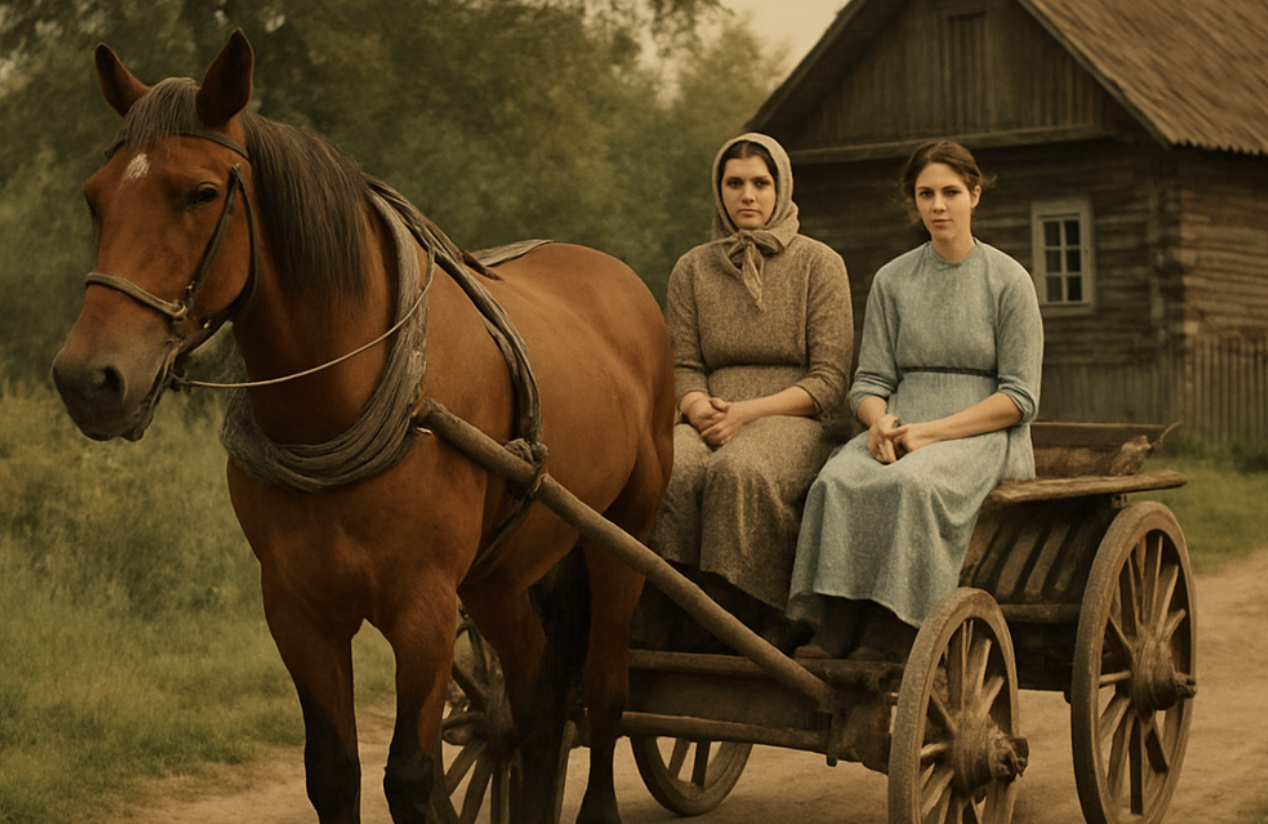Call your village mom! Let her come and clean up after me since you’re not capable of handling it yourself.”
These words, thrown sharply with a venomous sneer, sliced through the silence of the living room like a whip. Everyone in the room froze in shock. Even Sasha, holding a spoon over a cup of hot tea, stopped. The steam rising from the drink suddenly seemed out of place, almost indecent in the tense pause.
Lena did not scream. She did not cry. She simply straightened up, like a taut string, and calmly responded:
— “Okay. I’ll call her.”
Do you know such pain? The kind that cannot be washed away with tears, nor dulled by chocolate or a blanket? It stays inside—pressing on the chest, stinging in the throat, ringing in the bones. And every night it whispers the same thing: “You are nobody.” Lena had been living with this whisper for two years, ever since she married Sasha.
He was kind. He was caring. But he was weak. And his mother…
Ah, his mother.
Tamara Alekseevna.
A woman whose gaze could melt metal, and every word could destroy a person’s self-esteem down to the foundation. Her son, her beloved Sasha, married Lena—a simple girl from the village, whose hands knew the earth, and whose mind held her grandmother’s recipes instead of university knowledge.
How Tamara Alekseevna despised this simplicity. Every accent, every intonation of Lena’s made her cringe. Her soft laugh, lowered eyes, sincere words of gratitude—everything about her made her mother-in-law feel the urge to condescend or humiliate.
— “Simplicity is worse than theft,” she liked to repeat to the neighbors. “And my daughter-in-law has so much of it, you could file a police report.”
Every convenient moment, Tamara Alekseevna used to launch another attack:
— “Did she come with the same bag again? We’re not at the market, dear.”
— “Don’t know how to hold a glass? Not surprising—you probably drank from cans in the village, right?”
— “Did you cook this? Well… it’s edible. Though look at the way it’s served—Sasha even pushed his spoon away. Right, son?”
Sasha remained silent. As always. And Lena, sitting at the table, clenched her fists and pretended it didn’t bother her. But can you stop feeling when someone is slowly cutting you—without a knife, but precisely in the heart?
That evening, Lena put on her best dress—strict, gray, with a lace collar. In it, she felt especially feminine. She carefully adjusted her hair in front of the mirror, touched up her lips. Sasha took her hand, looked into her eyes, and said:
— “Everything will be fine. I’m with you.”
But he didn’t know that nothing had been fine for a long time. Not because Lena was from the village. But because he allowed his mother to humiliate her. He stayed silent when she threw her sharp remarks. He justified it, as if it could be justified:
— “She’s just worried.”
— “That’s just how she is, you can’t change her.”
— “Just endure a little…”
And it all started so simply. An ordinary love. A city boy. A girl from the village. He came on a business trip—and stayed. For her. At least, that’s what Lena thought.
When they entered Tamara Alekseevna’s apartment, Lena immediately felt like an outsider. An outsider in this house with large paintings, the cold gleam of the parquet floor, and crystal chandeliers looking down on her from above, as if she were an intruder.
Her mother-in-law greeted them with a look that said, “Here comes our village guest.”
— “Well, here you are,” she said with a frosty voice. “I hope there were no incidents today.”
Lena remained silent. She just tightened her grip on Sasha’s hand.
— “Did you explain to your wife how to use a napkin?” Tamara Alekseevna sneered. “So the sauce doesn’t spill on the table again.”
Sasha winced:
— “Mom…”
— “What? I just want everything to be proper,” she spread her arms theatrically. “This isn’t some village diner where you eat from a common pot and wipe your hands on your skirt.”
She snorted dryly and threw Lena a look of disdain, as if she had appeared in dirty boots on a pristine white carpet.
— “You think just because you put on some lipstick and did your hair, you’re now on the same level as me? Sweetheart, you can’t just wash the smell of the village off.”
Sasha shuddered as if he wanted to object, but seeing how tightly Lena pressed her lips together, he changed his mind. A heavy sense of guilt grew inside him, but he remained silent again.
— “Mom, maybe that’s enough?” he said uncertainly.
— “I’m speaking the truth!” Tamara Alekseevna snapped. “Let her first learn how to behave properly before sitting at this table.”
Humiliating someone doesn’t always require shouting. Sometimes, one tone, a barely noticeable pause, or a slightly raised eyebrow is enough.
Lena tried to hold herself together, but each of her mother-in-law’s words pierced her like needles. Especially when she suddenly smirked:
— “Listen, Lena, my cleaning lady is sick. And you—you’re a hardworking girl, your hands aren’t soft. Call your peasant mother, let her come. Cleaning, mopping, teapot—these are your specialties, right?”
Silence hung in the room. Thick, cold.
Lena slowly raised her gaze and looked Tamara Alekseevna directly in the eyes.
— “Okay. I’ll call.”
And she really dialed the number.
Have you ever seen a woman who can crush someone with just a glance? Now imagine how that very woman starts to crumble. Not with a scream, not with tears—but quietly, deeply inside.
The next day, when Tamara Alekseevna heard the doorbell, she went to open it with a satisfied look on her face. She imagined the scene: a woman in a headscarf, with a shopping bag, a village simpleton. What a triumph it would be!
But in the doorway stood a confident, composed woman in a strict business suit. With neat hair, perfect nails, and a look that could make even the bravest person retreat.
— “Hello. I’m Nadezhda Pavlovna. Lena’s mother.”
Something inside Tamara Alekseevna cracked at that moment.
There are moments that turn everything upside down. Without shouting, without scandals. A woman just enters the house and says:
— “My daughter is not a servant.”
And you can’t find a thing to say. Because you’re used to crushing. And she’s used to standing her ground. And that quiet strength is scarier than any rage.
— “You must have made a mistake,” Tamara Alekseevna muttered.
— “No,” Nadezhda Pavlovna calmly replied. “You were the one who made the mistake. About people. About my daughter. About yourself.”
After that, there was a conversation that in normal families happens once in a lifetime—or never.
— “You think my daughter is a provincial girl unworthy of your son. But let me ask you: who are you to judge?”
— “I’m a mother.”
— “And I’m a mother. But I taught my daughter not to humiliate others.”
No one drank coffee anymore. Lena made herbal tea that her mother brought—chamomile, thyme. It smelled of childhood, home, comfort. The daughter sat next to her mother and for the first time in a long time felt: everything would be okay. For real.
— “You know, dear,” Nadezhda Pavlovna said quietly, “what matters most is not where you were born. What matters is who you became.”
…
And in the evening, silence fell. Then Sasha, gathering his strength, stood between the two women:
— “Mom, please—enough. Lena is my wife. I love her. Please: respect her.”
He didn’t shout. But in his voice, there was determination. And that’s when Tamara Alekseevna realized: she was losing control. Over her son. Over the situation. Over the world she knew.
And perhaps, for the first time in her life, she felt ashamed.
Have you ever felt your dignity returning? Not suddenly, but gradually—with every word, with every tear you didn’t shed.
A few days later, Tamara Alekseevna called Lena:
— “I need to apologize. I was wrong. I’m ashamed.”
Lena paused for a moment.
— “I need time.”
You know, sometimes all you need for happiness is one cup of tea. In the kitchen. Next to your mom. Without porcelain sets, without crystal, without “proper” etiquette.
— “So, darling, how’s your mother-in-law?” Nadezhda Pavlovna asked, taking a bite of a gingerbread.
— “She’s trying to change,” Lena smiled gently.
— “That’s good. The main thing is, she understood: respect can’t be bought. It has to be earned.”
And maybe, that’s the whole meaning of life.



